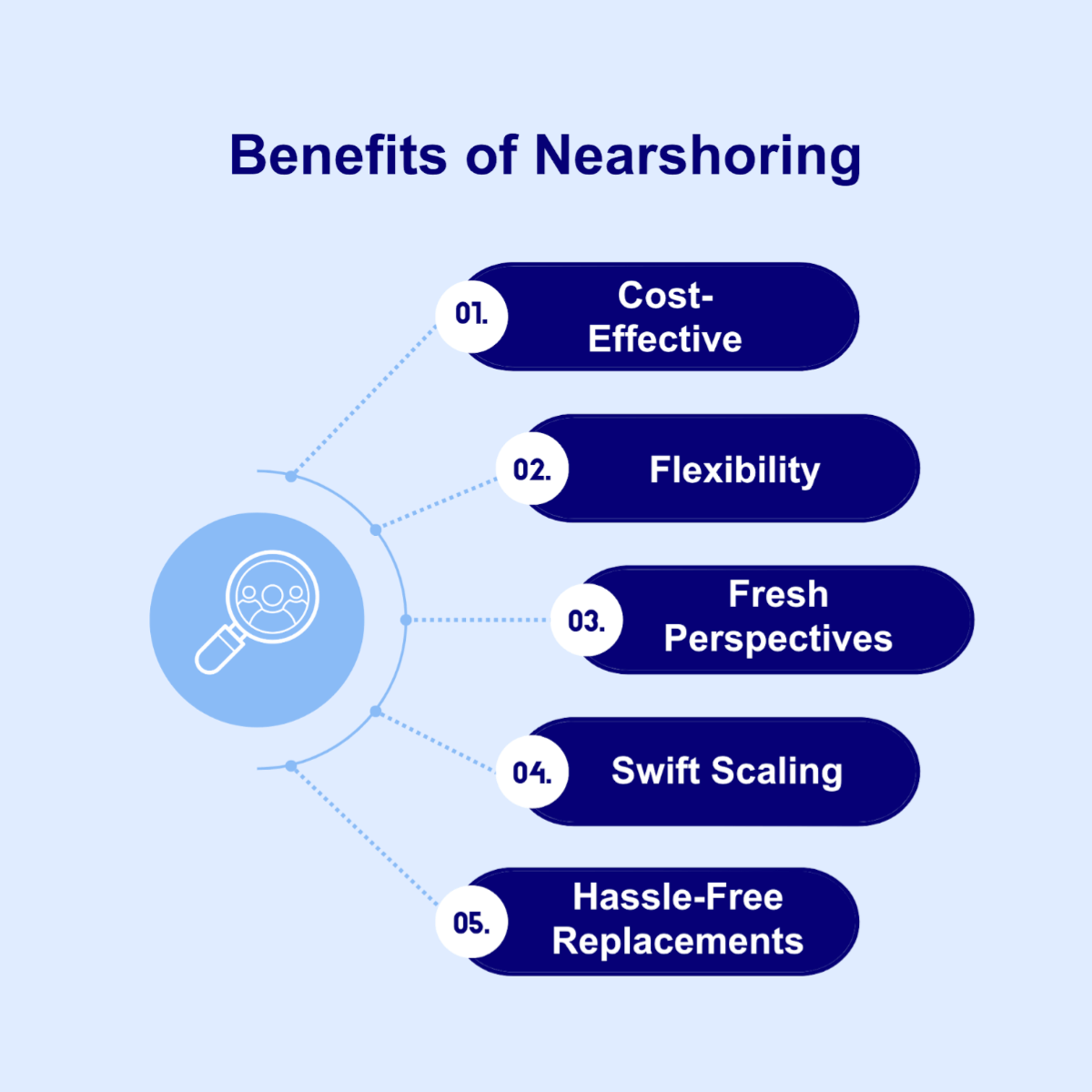
Nearshoring vs. Recruitment - Unlocking the Future of Team Expansion
Written by Danubius IT Solutions
Growing your team? The competition for top-notch developers in Western Europe is cutthroat. In many regions, it feels akin to rounding up unicorns – a Herculean task.
These in-demand developers, understandably, have their pick of the lot, often leading to higher salary expectations or a more relaxed work ethic. This growing challenge has shifted many companies' gazes eastwards, to nearshoring.
The Rise of Nearshoring
Imagine a cost-effective supermarket in the city – it's not just affordable but offers a diverse range of quality goods. This is how Eastern Europe positions itself in the tech landscape. Western European companies are increasingly looking eastwards. But what's the pull?
Western European companies are recognizing the potent combination of affordability and expertise that Eastern European tech firms bring to the table. By collaborating with these tech powerhouses, they're getting top-tier service without the premium price.
It's not just about cost savings; it's about tapping into a vast reservoir of talent and innovation. As we move forward, we'll explore more about why nearshoring to Eastern Europe is such a compelling strategy for Western European businesses.

Benefits of Nearshoring: A Fresh Approach to Scaling
-
Cost-Effective: One of the primary attractions of nearshoring is the potential savings. With the availability of a talented pool of professionals in regions like Central Eastern Europe, companies can access high-quality services without bearing the steep costs associated with hiring local resources. Whether it's a difference in wage expectations or the overall economic landscape, nearshoring typically offers a much more cost-effective route.
-
Flexibility: In the ever-evolving landscape of business, agility is key. Nearshoring shines in this respect. Companies can dynamically adjust their team size to match project demands. This flexibility allows for swift team expansion during peak periods and equally rapid downsizing when required – all of this without the legal and financial implications of traditional employment forms.
-
Fresh Perspectives: There's a certain invigorating energy that comes with diversifying your team. Outsourcing, by its very nature, exposes a company to varied perspectives and solutions. When this is complemented by domain-specific knowledge and up-to-date tech skills of the nearshoring partner, the collaboration can lead to innovative problem-solving and ideation. It's the merging of fresh external insights with deep-seated industry know-how.
-
Swift Scaling: Recruitment, with its multi-layered processes—job postings, interviews, negotiations, and onboarding—can be a time-consuming endeavor. Nearshoring effectively bypasses these stages. By partnering with a nearshoring firm, companies gain instant access to pre-vetted, skilled professionals, enabling faster team augmentation and streamlined project kick-offs.
-
Hassle-Free Replacements: In the unfortunate event of an employee departure, the burden doesn't fall on the client. Instead, the nearshoring partner takes responsibility. Not only do they ensure a quick replacement to maintain continuity, but they also manage the transition seamlessly. The training, knowledge transfer, and integration—everything is handled by the nearshoring firm, keeping the client's operations undisturbed and ensuring their comfort.
In essence, nearshoring offers a potent mix of efficiency, flexibility, and innovation, tailored for businesses seeking to optimize their operations without compromising on quality.
Addressing Nearshoring Concerns
Despite the evident advantages, apprehensions persist. Let’s untangle them:
-
Cultural Misalignment? Every region has its distinct cultural flavor, but the differences between Western Europe and CEE are relatively minor when compared to broader global contrasts. Before a full-scale partnership, a pilot project can act as a litmus test, assessing if the cultural fit is right for your needs.
-
Lack of Control? The principles of Agile are universal and also helpful in working with remote teams. Through regular sprint reviews and demos, businesses maintain a firm grasp on the project's progress. Appointing a dedicated product owner or manager on the client-side can further fine-tune the direction, ensuring alignment with business goals.
-
Worries about Communication? In today's digital era, communication is paramount. We, at Danubius, place a premium on fostering transparent dialogues with partners. On the rare occasion a communication gap arises, corrective measures, including potential replacements, are swiftly implemented.
-
Quality of Work? The academic rigor of Eastern European tech institutes is world-class. This foundation equips professionals with a blend of theoretical depth and practical acumen. The result? Clients frequently find their deliverables not just meeting, but exceeding expectations.
-
Transparency Concerns? The remote work revolution has taught us one thing: work is no longer a place. It's an activity. As businesses globally have adapted to this mindset, the importance has shifted from 'where you work' to 'how effectively you work'. Performance metrics and outcomes are the new yardsticks.
-
Knowledge Retention? A common concern around external developments is that the internal staff may not be able to take on board or touch the codebase of an external team. That would result in vendor-dependency that has burned many companies in the past. To successfully mitigate this issue, we typically push code into the code repository of our customers, follow their coding guidelines if available, and they are encouraged to conduct code reviews or even infuse their colleagues to form a shared team. It not only bolsters control but ensures knowledge stays in-house. For instance, we document and educate, preventing dependency and avoiding vendor lock-in.
-
Team Cohesion? Time and experience have shown us at Danubius that distance is merely a number. Through sustained engagements, regular touchpoints, and periodic in-person gatherings, remote team members often forge bonds as strong as their in-house counterparts. It's about fostering a culture of inclusivity, collaboration, and mutual respect.
In addressing these concerns, the goal is to demystify nearshoring and showcase its potential as a viable, efficient, and rewarding strategy for businesses.
The Recruitment Quandary
Recruitment is a tried and true method for businesses looking to add talented individuals to their teams. It allows companies to handpick professionals who align with their culture, values, and specific requirements. This ensures a sense of ownership, deep integration with the company ethos, and often long-term loyalty.
However, the recruitment process is not without its challenges. The costs associated with recruitment can quickly add up: think headhunter commissions, advertising for vacancies, time spent on multiple interview rounds, and training costs during onboarding. Moreover, the time investment is considerable. From the moment a job opening is posted to the point where the recruit is fully operational can span several months. Even after this, there's a period of adaptation before the new hire reaches optimal productivity.
Now, let's consider nearshoring. The first thing that stands out is efficiency. With a single, comprehensive interview – which can be conducted online – you are often ready to integrate a developer or a team into your project. There's no prolonged waiting period. Nearshoring firms maintain a roster of skilled professionals who are constantly upskilling. They're not just available; they're prepared. Need someone to jump into a project immediately post-recruitment? These firms can deliver, tapping into their pool of ready developers for instantaneous deployment.
In Conclusion
While recruitment has its place, especially for core teams, the world of nearshoring offers an appealing proposition: technical expertise, flexibility, and cost-effectiveness bundled together. With the right mindset – not too dissimilar from recruitment – businesses can tap into a reservoir of talent and efficiency, propelling them closer to their goals.
If you’re ready to discover how nearshoring can supercharge your projects without the recruitment roadblocks – or would like to start building a team immediately and efficiently – contact us and let’s talk!
Interested in IT solutions tailored to your business? Contact us for a free consultation, where we'll collaboratively explore your needs and our methodologies.



.png?alt=media&token=284268ac-cb06-42d5-8d1d-9e607067237c)

